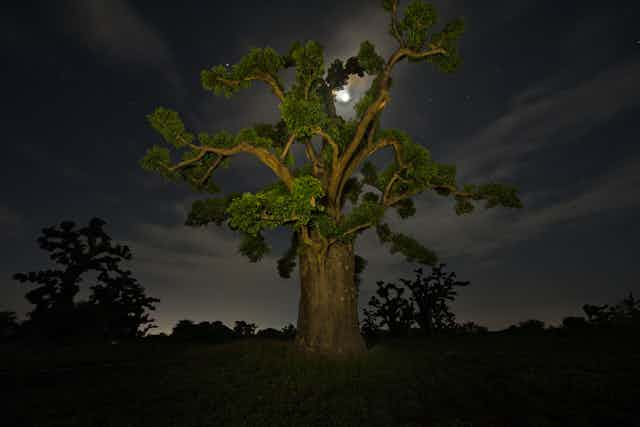The influential Caine Prize for African Writing for 2023 was won by a power couple from Senegal. Their short story A Soul of Small Places (which can be read over here) echoes deeper trends in the country’s literature while picking up on the growth of horror and speculative fiction across the continent. African literature specialist Caroline D. Laurent explains.
What’s the Caine Prize and what does winning it mean?
The Caine Prize, awarded annually since 2000, acknowledges a short story written in English by an African author. Its objective is to introduce African literature to a broader readership. It’s named in honour of Sir Michael Harris Caine, co-founder of the Man Booker Prize. It consists, firstly, of a £10,000 cash prize for its winner(s). Winning it provides the opportunity for writers to discuss their work, engage with fellow writers, meet with the press and publish their work in the Caine Prize anthology, all with the prospect of gaining recognition. It often serves as a springboard for further publication. It’s helped launch the careers of writers like Nigerian novelists Helon Habila and Tope Folarin, Zimbabwean novelist NoViolet Bulawayo and Zambia’s Namwali Serpell.
Who are this year’s winners?
This year’s winners are a duo of Senegalese writers, Woppa Diallo and Mame Bougouma Diene. Diallo is a lawyer and feminist activist who, at 15, founded The Association for Keeping Girls in School in Matam, Senegal. Her work served as the inspiration for the winning story, hence the main protagonist’s name, Woppa Diallo.
Diene is a Franco-Senegalese American humanitarian and writer. He serves as the francophone spokesperson for the African Speculative Fiction Society and contributes as a columnist to Strange Horizons, an online speculative fiction magazine. His debut collection Dark Moons Rising on a Starless Night was nominated for two 2019 Splatterpunk Awards. He often blends elements of horror, social issues and local beliefs in his work. A Soul of Small Places is an example of his preferred genres.
What’s the story about?
A Soul of Small Places is about Woppa, a young girl who lives in the rural town of Matam in Senegal. Woppa has the task of protecting her younger sister Awa on their way to school. Indeed, girls going to school are often the prey of men who sexually assault them and force them into early marriages. Woppa and Awa’s daily experience of fear to and from school highlights the lack of response from both the authorities and citizens. Gender-based violence remains shrouded in silence, suppressed by feelings of shame and guilt. Hence the intervention of the Soukounio, a flesh-eating djinn who, in this narrative, serves as a protector and avenger of young girls. When all else fails, it is only the gods who can safeguard the girls of Matam.
Why’s it so good?
A Soul of Small Places is a beautifully written short story that has been aptly described by the Caine Prize judges as “tender and poetic”. However, it’s also a harrowing and infuriating tale. The power of literature to focus on individuals and their personal experiences lends a human face to an unresolved social issue. The authors’ skilful use of suspense and horror to convey this idea leaves a profound impact on the reader, with the hope of prompting them to consider the issue and take action.
Read more: Mohamed Mbougar Sarr: Senegalese novelist's win is a landmark for African literature
Diallo and Diene’s story is deeply rooted in its local setting. Matam is described as the second hottest place in Senegal and the heat is palpable in the description of the landscape, where nature is both menacing and protective. References to different gods and spirits also highlight the environment in which Woppa and her family live. However, this short story can also resonate with the fears experienced by young girls and women globally. The anxiety of girls walking home after sunset is something many women have experienced. A Soul of Small Places portrays experiences that, unfortunately, are all too universal. The lack of adequate responses also resonates, regardless of where one lives.
What does this say about Senegalese fiction?
Recently, Senegalese fiction has engaged with important issues in Senegal, whether pertaining to homophobia – as seen in Mohamed Mbougar Sarr’s De Purs Hommes (Pure Men) – or gender-based sexual violence, as seen in A Soul of Small Places.
Read more: New Kiswahili science fiction award charts a path for African languages
Also worth noting is that Diallo and Diene wrote their story in English, not French, the language of Senegal’s former colonisers. The choice to write in English works to dismantle the neocolonial use of languages based on one’s origin and the colonial past of one’s country. In this sense, English appears more as a global language. The Kiswahili Prize for African Literature, where authors write in African languages, complements the Caine Prize. The fact that languages are being redistributed points to the dynamism of African literature, challenging the use of the languages of former colonisers in different ways.
Senegalese literature plays a vital role in encouraging people to read, reflect upon and engage with significant matters in the country. Literature serves as a tool for recognition, understanding and action. A Soul of Small Places is a beautiful, terrifying example of this.

